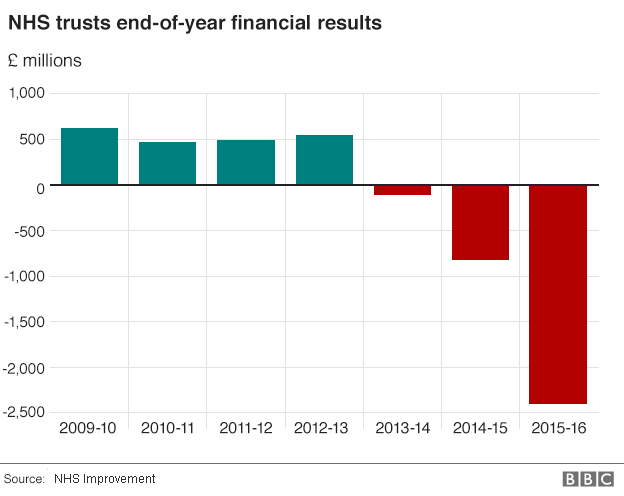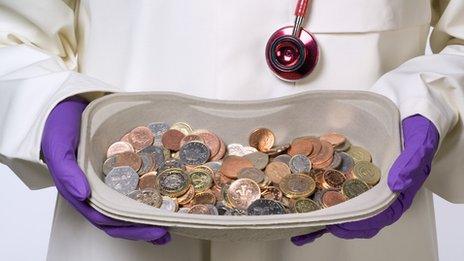Patients 'could suffer' as NHS trusts bust budgets
- Published

Patient care could start to suffer after hospitals and other NHS trusts in England overspent by a record £2.45bn last year, experts are warning.
The unprecedented deficit for 2015-16 - triple what was recorded the year before - is largely a result of hospitals busting their budgets.
They will now need to use extra money they are being given this year to bail themselves out.
Hospital chiefs warned that may lead to longer waiting times and poorer care.
Chris Hopson, chief executive of NHS Providers, which represents trusts, said the situation was "simply not sustainable".
"We have to rapidly regain control of NHS finances, otherwise we risk lengthening waiting times for patients, limiting their access to wider services and other reductions in the quality of patient care."
The NHS in England is already missing a series of key waiting time targets, including in A&E, cancer care and the ambulance service.

There are also a record number of people on waiting lists for routine operations, such as knee and hip replacements.
Anita Charlesworth, of the Health Foundation think tank, said the mood in the NHS "could not be bleaker".
"The level of deficits in terms of scale and how many hospitals are in deficit is unprecedented. It puts organisations under stress, which makes them fragile and risky.
"There is pressure on recruitment, pressure on management and that has an impact on services. We are already seeing waiting time targets being breached."
Analysis: Is enough being spent by the NHS?
Analysis: Mind the NHS financial black hole
Financial problems 'endemic in the NHS'
Rising demand for NHS services and high spending on agency staff were cited as key factors.
However, the deficit was not as large as was predicted earlier in the year as NHS bosses had urged hospitals to rein in spending, particularly on locum staff, on which a cap on how much can be charged has been introduced.
The figures have been released by the regulator NHS Improvement and cover ambulance, mental health and community trusts as well as hospitals.
Overall 65% of the 240 trusts are in deficit with nearly all hospitals ending the year in the red.
When hospital trusts are taken on their own the overspend was £2.6bn on a budget of £56.1bn. Nearly nine in 10 hospitals reported finishing the year in deficit.

Does it matter if the NHS overspends?

Hospitals and other health services are not like businesses. They're not going to just go bust, as the government can always step in.
But the financial problems do matter. The deficits being racked up are massive. You probably have to go back to a very different era - the early 1950s - to find a similar scale of overspending, and that led to charges being brought in for spectacles, dentistry and prescriptions.
This time the impact is likely to be felt in terms of what doesn't happen. The Department of Health has made it clear the overspends will not be simply written off. Instead, hospitals (most of the overspends are concentrated among them) will have to use the extra money they have got this year to pay off their debts.
If that happens on a large scale, it puts the NHS on a back foot. Recruitment freezes are introduced, building projects are stopped or delayed and services are scaled back. These measures are already being taken, but greater use of them will just make it more difficult for the NHS to meet its waiting time targets and provide high-quality care.

Taken together all these trusts account for about two-thirds of the entire £116bn health budget - they do not cover spending on GPs, training, public health or any unspent money held by local health managers.
That means the Department of Health could still balance the books when the overall accounts are released later in the summer.
Although a hospital trust financial director, who wishes to remain anonymous, suggested the Department of Health was "cooking up accounting alchemy" by "turning hospitals' very large aggregated deficits into a much lower figure to ensure the NHS meets the spending limit set by HM Treasury".
He told the BBC that examples included shifting the recording of capital spending - for buildings - into day-to-day running costs.
Under pressure
A Department of Health spokesman said: "The transfer from capital to revenue makes no difference to the overall departmental picture given Parliament has voted to approve it - to say otherwise is misleading."
He also pointed out that the final accounts will be reviewed by the National Audit Office.
"We recognise parts of the NHS are under pressure as demand rises due to our ageing population, but we are providing intensive support to improve performance, boost efficiency and reduce the use of expensive agency staff," he added.
The rest of the UK does not release equivalent figures as hospitals are not run as autonomous organisations as they are in England.
It means the accounts cover a wider range of services and therefore may take into account surpluses in other areas of the health service. The final accounts have yet to be published.
- Published15 March 2016
- Published25 February 2016
- Published16 December 2015

- Published9 October 2015
- Published18 June 2014
